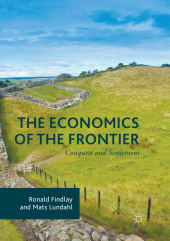 Neuerscheinungen 2018Stand: 2020-02-01 |
Schnellsuche
ISBN/Stichwort/Autor
|
Herderstraße 10
10625 Berlin
Tel.: 030 315 714 16
Fax 030 315 714 14
info@buchspektrum.de |

Ronald Findlay, Mats Lundahl
(Beteiligte)
The Economics of the Frontier
Conquest and Settlement
Softcover reprint of the original 1st ed. 2017. 2018. xiv, 448 S. 27 SW-Abb. 210 mm
Verlag/Jahr: SPRINGER PALGRAVE MACMILLAN; PALGRAVE MACMILLAN UK 2018
ISBN: 1-349-95637-6 (1349956376)
Neue ISBN: 978-1-349-95637-1 (9781349956371)
Preis und Lieferzeit: Bitte klicken
This book deals with the economics of establishing a frontier by conquest or by peaceful settlement, the costs involved, and the optimum extension of the territory. The opening chapters discuss the most relevant literature about frontiers - conceptual, theoretical and empirical - and introduce the fundamental theoretical model for extending frontiers which is drawn on throughout the book. The authors use this theoretical apparatus by applying it to a number of historical cases. These include the division of the European territory between the Byzantine Empire, Islam and Western Europe, the creation and expansion of the Mongol Empire, the impact of the Black Death, the European discovery of the New World, the staples trade from 1870-1914, and the rise and fall of banditry in Brazil.
The Economics of the Frontier brings together a collection of essays which explore how economically optimal frontiers were founded from sixth-century Europe through to twentieth-century Brazil.
Introduction: Frontiers and Empires.- 1. Frontiers and Empires in Historical Perspective.- 2. Modeling Global Interdependence: Centers, Peripheries and Frontiers.- 3. Towards a Model of Territorial Expansion and the Limits of Empire.- 4. Demographic Shocks and the Factor Proportions Model: From the Plague of Justinian to the Black Death.- 5. The First Globalization Episode: The Creation of the Mongol Empire or the Economics of Chinggis Khan.- 6. Towards a Factor Proportions Approach to Economic History: Population, Precious Metals, and Prices from the Black Death to the Price Revolution.- 7. International Trade and Factor Mobility with an Endogenous Land Frontier: Some General Equilibrium Consequences of Christopher Columbus.- 8. Natural Resources, ´Vent-for-Surplus´ and the Staples Theory.- 9. Resource-Led Growth - A Long-Term Perspective: The Relevance of the 1870-1914 Experience for Today´s Development Economies.- 10. LampiÆo and the Colonels: On the Political Economy of Banditry.- Epilogue: Frontiers - Theory and History.
Ronald Findlay is Ragnar Nurkse Professor Emeritus of Economics at Columbia University, USA. His main research fields are international economics, development economics, economic history, and economic theory.
Mats Lundahl is Professor Emeritus of Development Economics at the Stockholm School of Economics, Sweden. His main research fields are development economics, international economics, economic history, history of economic doctrines, and agricultural economics.


